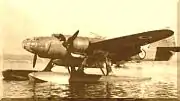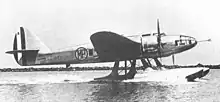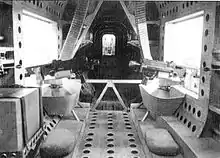| RS.14 | |
|---|---|
 | |
| Role | Long-range maritime reconnaissance floatplane |
| Manufacturer | Fiat |
| Designer | Manlio Stiavelli |
| First flight | May 1939 |
| Introduction | May 1941 |
| Retired | 1948[1] |
| Primary users | Regia Aeronautica Italian Co-Belligerent Air Force |
| Produced | May 1941 - September 1943 |
| Number built | 186 plus 2 prototypes[2] |
The Fiat RS.14 was an Italian long-range maritime strategic reconnaissance floatplane. The RS.14 was a four/five seat all-metal cantilever low/mid-wing monoplane powered by two wing-mounted 626 kW (840 hp) Fiat A.74 R.C.38 engines. It had a conventional cantilever tail unit with a single fin and rudder. Its undercarriage consisted of two large floats on struts. It had a glazed nose for an observer or bomb aimer. The pilot and copilot sat side by side with a wireless operator's compartment behind them. In the bombing role the RS.14 was fitted with a long ventral gondola to carry various combinations of anti-submarine bombs (up to 400 kg (880 lb)).
Development
The RS.14 was designed by Manlio Stiavelli at the CMASA works at Marina di Pisa. The first of two prototypes flew in May 1939.
A prototype landplane version AS.14 was built and first flown on 11 August 1943. It was designed as a ground-attack aircraft and intended to be armed with a 37 mm (1.5 in) cannon and 12.7 mm (0.50 in) machine guns. It was not ordered and no others were built.
Operational history
The RS.14 went into service with the Italian Air Force with a number of maritime strategic reconnaissance squadrons at bases around the Italian coast and also in Sicily and Sardinia. They were used for convoy escort duties and anti-submarine patrols. Occasionally they engaged in aerial combat, obtaining unexpected victories such as when, on Saturday 9 May 1942, an RS.14 intercepted Spitfires that took off from the carriers HMS Eagle and USS Wasp, headed for Malta, and machine-gunned two. The two RAF fighters collided and fell into the sea. Both pilots were killed.[3] After the 1943 Armistice a few survivors were operated by the Italian Co-Belligerent Air Force. At the end of the Second World War the aircraft were used for liaison duties around the Mediterranean carrying up to four passengers.
Variants

- RS.14
- Production float plane with 840 hp (618 kW) Fiat A.74 R.C.38 engines, 188 built including two prototypes.
- AS.14
- Land plane version with retractable landing gear, one built.
Operators
- Italian Air Force operated six surviving Fiat RS.14 until 1948[4]
Specifications

Data from Donald, 1997, pg 413.
General characteristics
- Crew: three
- Length: 14.1 m (46 ft 3.25 in)
- Wingspan: 19.54 m (64 ft 1.25 in)
- Height: 5.63 m (18 ft 5.75 in)
- Wing area: 50 m2 (538.21 sq ft)
- Empty weight: 5,470 kg (12,059 lb)
- Gross weight: 8,470 kg (18,673 lb)
- Powerplant: 2 × Fiat A.74 R.C.38 14-cylinder radial piston , 618 kW (840 hp) each
Performance
- Maximum speed: 390 km/h (242 mph, 210 kn)
- Range: 2,500 km (1,553 mi, 1,350 nmi)
- Service ceiling: 6,300 m (20,670 ft)
Armament
- 1 × 12.7 mm (0.5 in) machine gun
- 2 × 7.7 mm (0.303 in) machine guns
- up to 400 kg (882 lb) of bombs
See also
Aircraft of comparable role, configuration, and era
Related lists
Notes
- ↑ Hayles, John, ed. (2008-08-12). "Italian Air Force Aircraft Types". Aeroflight. Archived from the original on 2019-12-27.
- ↑ "Fiat RS.14". Archived from the original on 2016-03-04. Retrieved 2014-11-26.
- ↑ Rogers 2000, p. 149.
- ↑ "Birth of Aeronautica Militare" Aeronautica Militare. Retrieved 13 July 2016
References
- Donald, David, ed. (1997). The Encyclopedia of World Aircraft. Prospero Books. ISBN 1-85605-375-X.
- Monday, David (1984), The Concise Guide to Axis Aircraft of World War II, Chancellor Press, ISBN 1-85152-966-7
- Rogers, Anthony (2000), Battle over Malta - Aircraft Losses & Crash Sites 1940–42, Stroud, Gloucestershire: Sutton Publishing, ISBN 0-7509-2392-X
- The Illustrated Encyclopedia of Aircraft (Part Work 1982-1985), 1985, Orbis Publishing, Page 1812